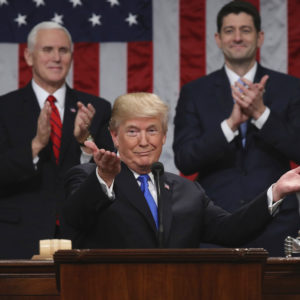At the start of summer, just as most Americans were headed out for Memorial Day observances and travel, President Trump suddenly put out three hugely consequential executive orders to make federal agencies more accountable and fiscally responsible.
Specifically, the orders will make it easier to remove federal employees for poor performance and misconduct, require agencies to negotiate more effective union contracts and limit the amount of time federal employees conduct union business on the taxpayers’ dime.
Unsurprisingly, labor unions have filed multiple lawsuits against all three executive orders and are asking for a temporary injunction to stop the implementation of the new policies. National Federation of Federal Employees President Randy Erwin says that “if implemented, these orders would wreck the system of collective bargaining in the federal sector.”
Erwin’s statement is over the top. The orders simply take real steps to make the federal government more effective and efficient. The law governing federal labor relations, the 1978 Federal Service Labor‑Management Relations Statute, has failed to meet its goals: “safeguard the public interest,” advance “the effective conduct of public business,” and “improve employee performance and the efficient accomplishment of the operations of the Government.”
Trump took particular aim at one component of the federal collective bargaining system that yielded no discernible benefits but cost taxpayers plenty. That provision is known as union official time, and what it does is grant federal employees paid time off from their government duties to perform union work.
At least a thousand federal employees spend 100 percent of their time performing union activity instead of serving the public. The real number is likely higher, but many agencies fail to track official time use by federal employees. This is unacceptable. Federal employees should perform the public’s business, and federal agency managers should know what employees are doing while paid by the taxpayer.
Illogical as it seems, unions and Democrats claim official time is a crucial cog in the federal collective bargaining system. They posit that allowing federal employees to perform union business instead of their regularly assigned duties somehow contributes to effective performance of public services and makes government operations more efficient. But how can a federal employee on 100 percent official time, someone who never conducts any public service, promote the public interest and contribute to effective performance of public services?
Thankfully, Trump recognizes this problem and issued the executive order called Ensuring Transparency, Accountability, and Efficiency in Taxpayer Funded Union Time Use, which curtails how much time a federal employee can spend each year to 25 percent on union activities and prohibits agencies from paying for labor union office space, travel and supplies.
This will greatly reduce how much official time is used. According to the latest numbers from the Office of Personnel Management, in fiscal year 2016 federal employees spent 3.6 million hours on official time, costing taxpayers well over $175 million.
The executive order also implements important safeguards to ensure official time is used sparingly, for proper activities, and not taken without permission, which is now a common practice. Under the order, federal employees must receive advance written authorization from an agency supervisor to use union official time. Though this is not an entirely new requirement, as some current collective bargaining agreements require this, an inspector general report found federal employees have been known to disregard this kind of obligation.
However, the order packs some punch to ensure tax dollars are spent wisely and federal employees serve the public. If official time is used without advance authorization or for prohibited practices like lobbying Congress, the employee “shall be considered absent without leave and subject to appropriate disciplinary action.”
“Repeated misuse of taxpayer-funded union time may constitute serious misconduct that impairs the efficiency of the federal service. In such instances, agencies shall take appropriate disciplinary action to address such misconduct.”
Despite hysterical rhetoric from some Democrats that this is an assault on the federal workforce, it is far from that. The executive orders simply try to ensure federal employees are serving the public and not special interests like labor unions. How is that not a bipartisan value?

